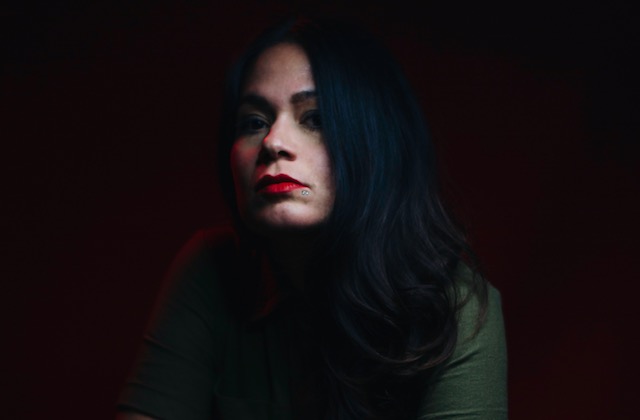Name: Marissa Johnson-Valenzuela
Hometown: Wichita, Kansas
Latest Project: "No Otro Lado," the artist’s musical tribute to Mexican and other Latinx Americans’ resilience through generations of xenophobic violence and border politics. The album comes out tomorrow (November 17).
Why You Should Care: “No Otro Lado” (translation: "No Other Side") marks the latest and most complete step in Johnson-Valenzuela’s evolution as an artist, activist, performer and witness to social justice movements. The record, which the Philadelphia-based creator describes as “conceptual reggaeton,” mixes many of the musical and political concerns of her previous work.
Johnson-Valenzuela’s story begins in Wichita, Kansas, where she was the child of a Mexican-American mother and White father. “I grew up being asked, ‘what are you?’ my whole life,” she says. She didn’t find answers to identity questions in her home life, so she sought solace in books and music.
“Books really started my activism, and from a very young age, I was concerned about human and civil rights,” she explains about the early influence of author Leo Tolstoy, classic comparative urban politics text “Detroit: I Do Mind Dying” and other works she read as a teen. “I was also drawn to punk rock, alternative culture and activism. I did a [punk] zine in high school.”
At the same time, her brother got Johnson-Valenzuela into hip hop by introducing her to the Wu-Tang Clan’s “Enter the Wu-Tang (36 Chambers).” “I started buying hip hop albums on vinyl, before the vinyl resurgence,” she says.
These early adventures in beats would lead to her first major musical endeavor: DJing. In 2000, she moved to Philadelphia and dove deep into the city’s activist communities. Johnson-Valenzuela acquired a mixer, which allowed her to spin in local movement spaces. “People asked me to DJ benefits and house parties, so I was DJing a lot by the early ‘00s,” she says.
{{image:2}}
She also channeled her social justice passions into jobs helping formerly incarcerated teens who were on probation. Around that time, in 2005, the Philadelphia-based Leeway Foundation recognized Johnson-Valenzuela’s creative work with one of its inaugural Transformation Awards.
When the philanthropic organization awarded her a grant in 2012 for curating a creative writing anthology, Johnson-Valenzuela’s resume included multiple titles: DJ, author, activist, educator and independent publisher.
Johnson-Valenzuela says she once struggled to reconcile her various interests. Today, she tries to embrace what she calls her “artistic and activist multiplicity.” Just as she aims to erase the divisions between her various disciplines, “No Otro Lado,” challenges the idea of an actual Mexico-United States border.
rnt
On the 35th anniversary of the founding of the EZLN, we’re releasing a "conceptual reggaeton" album about the U.S.-Mexico border and the broader struggle for dignity and self-determination for all. I can’t think of a better day.
rntt
rntt11/17 @ICAPhiladelphia https://t.co/KW5myGwHbPrnt— no otro lado (@marissajv) October 27, 2018
Johnson-Valenzuela developed the 13 songs in “No Otro Lado” with producer Josh Hey. The album is the first in a series of political art albums that Tufts University professor Anthony Romero will curate. While both Hey’s production and Tufts’ funding support the record, “No Otro Lado” reflects Johnson-Valenzuela’s concern for Mexican-American and other Latinx peoples’ liberation.
For instance, the album release date coincides with the 35th anniversary of the Ejército Zapatista de Liberación Nacional, a leftist group that rose up against Mexico’s government during the ‘90s to promote Indigenous liberation and anti-globalization. Johnson-Valenzuela learned about the Zapatistas’ uprising by living among them on three occasions. Aay Preston-Myint’s cover image borrows from Trevor Paglen’s photograph of the Mexico-U.S. border through military surveillance technologies:
{{image:3}}
The messages come through most clearly in the album’s genre-fluid instrumentals and evocative lyrics about xenophobia. “Herencia” features Johnson-Valenzuela’s spoken-word accounts of incidents in which White mobs or killers lynched Mexican Americans. “Philly Kitchens” addresses the exploitation of Mexican and Central American restaurant workers through a spoken word passage by Johnson-Valenzuela and Spanish-language raps by Kicio, an undocumented restaurant worker.
“The main idea is that the United States and Mexico are, ostensibly, one country with a heavily militarized border,” she says about the album. “The histories are so intertwined, even today. The push and pull—bringing Mexicans when we need the labor, and kicking them out when we don’t need it, is an ongoing theme.” Johnson-Valenzuela adds that this cycle is playing out today, with Donald Trump’s presidency and his administration’s policy of family separation.
The songs on “No Otro Lado,” as well as two forthcoming music videos, all incorporate themes that she’ll further address in a planned novel and poetry collection. Says Johnson-Valenzuela, “To write an American novel, you have to include Mexico. Otherwise, you’re ignoring so much.”
Listen to “No Otro Lado” on Bandcamp. Philadelphia residents can watch Johnson-Valenzuela debut the album and music videos from it tomorrow night (November 17) at the Institute of Contemporary Art.
rn
